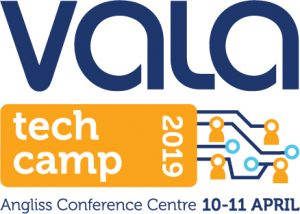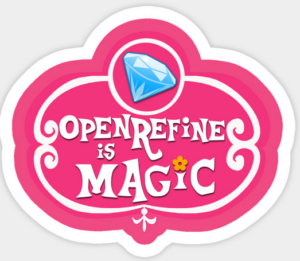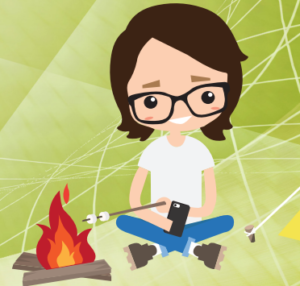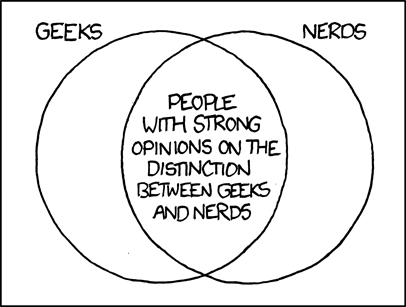
A couple of weeks ago (only a couple of weeks?!) I was a part of the 2019 VALA Tech Camp, a two-day event in Melbourne for tech-inclined librarians and library-inclined techies. Usually these posts are a variation on ‘Five things I learned at [event]’, but this time I actually did some of the teaching, so here are five things I taught. It was a very different experience to the 2017 Tech Camp—I definitely learned some things as well…
OpenRefine is magic! Been there, done that, wore the t-shirt. I presented a three-hour workshop on OpenRefine, the world’s greatest free and open-source data cleaning and editing program, to upwards of 37 keen participants. Assisted by the unbelievably calm Alexis Tindall, who had generously agreed a few weeks earlier to help a total stranger, I took our intrepid data wranglers through the main features of OpenRefine: importing and exporting data; faceting, filtering, clustering and editing data; transforming data using inbuilt scripting language GREL; and reconciling data against an external source. I demonstrated on both a CSV file and a gently-massaged MARC file, thinking participants could possibly use OpenRefine for both file formats.
True joy is seeing someone’s face as they are shown amazing things in Open Refine by @lissertations ?
— Mr E. Shaddow (@edwardshaddow) 10 April 2019
I learned a heck of a lot about OpenRefine in the course of writing the workshop slides and teaching materials. (You can view them on this GitHub repository.) It was a privilege to be able to share this knowledge with others, even if I spoke too quickly and seemed a touch nervous. Everyone was keen to learn, asked lots of questions, and looked like they got something out of the session, which is exactly what I had been hoping for.
‘I don’t know. But I will find out, and get back to you.’ The first step towards learning is to know that you don’t know something, right? It’s okay to not know things. I stated at the outset that neither Alexis nor I were experts, and that I was here in the spirit of peer-based learning. If you know the thing, you can teach the thing, etc. Though this was not a formal Library Carpentry workshop, I was inspired by the Library Carpentry ethos of peer-based learning, as introduced to me by Carmi Cronje and Fiona Jones at the LC workshop at NLS8. To think that was my first experience of OpenRefine, less than two years ago, and here I am teaching a workshop of my own… it’s been a wild ride.
As it happened, a couple of people asked questions I didn’t immediately have the answers to. I managed to answer one during the workshop, to the delight of the asker, while the other two are still awaiting my email. (Sorry! I am bad with email! I will get back to you, I promise!)

We can do the thing! (But we probably shouldn’t have.) Hugh and I both presented workshops while also being on the organising committee. I think we separately realised that trying to do both was a very bad idea, and that future committee members should not be allowed to do this. At the time, offering to run the workshop myself seemed easier than asking someone else to do it. I know better now!
Tech Camp was my first experience on an organising committee of this kind. It was also my first experience presenting a formal workshop or talk to a paying audience. I had never done either of these stressful things before, and here I was doing both of them at once. Did I mention I have an anxiety disorder? Fellow committee member Matthias remarked ‘You were playing on hard mode!’ and while I hadn’t thought of it that way, I definitely made it harder for myself than I needed to. I referred in 2017 to ‘the Herculean efforts of the organising committee’—I no longer consider this hyperbole. Running the 2019 camp has been a tremendous learning experience, and it’s opened a few doors for me professionally, but my stress levels were absolutely unreal. I think I could have managed solely being a committee member, or solely presenting a workshop (just). I barely managed to do both.
But I did everything I could. I lunched in the breakout room, I took my meds beforehand, people recognised when I needed company and also when I needed space, and overall it wasn’t a total disaster. To the extent I could control my symptoms I recognised that freaking out would accomplish nothing, so instead I tried to approach the workshop like a wave. It was gonna come anyway, and it would engulf me, and I would feel like drowning for a brief second, and then it would be over, and the sun would still be shining. Just let it crash over me. Just let it happen.
This is for the benefit of those who saw me present and perhaps thought I was handling things just fine. I’m told I looked a lot less stressed than I felt, which is… handy, I guess, but I’m not in the habit of airbrushing.

Just say no to mornings. You may have noticed I was meant to emcee the morning session on day 2 but mysteriously failed to appear. I was late and missed the start, meaning someone else had to fill in, and was so embarrassed I hovered in the foyer until the session was over. This was a fail on my part, but also hopefully it’ll teach event organisers not to expect anything of me until after 9am. (To my relief, my next speaking commitment at NLS9 is scheduled for after 11am. I am so not a morning person.)
I did an SQL thing! This is me cheating and using an ‘I taught myself’ literary device, haha. Having finally dispensed with my teaching responsibilities on day 1, I resolved to learn more things on day 2. The other workshop I attended was on SQL, by Arjen Lentz and Donna Benjamin. I had a feeling I would like SQL if only I had an idea of how to use it, and this workshop was a great introduction. Being a native English speaker, the syntax of SQL just makes sense, as it’s designed to.
I was particularly tickled by Arjen setting the scene with a very quick introduction to set theory. I inexplicably spent a term in year 7 learning set theory, ostensibly because my school had run out of space for all the fun electives and threw two classes’ worth of smart kids in extension maths instead. Until this session it had never once been useful. Now, suddenly, sixteen years later, it was exactly what I needed to know! And it was useful because SQL requires you to envision a particular data structure in order to query it, to hold a table in your head even if it’s not graphically represented. Including or excluding aspects of that dataset entails using terms like LEFT JOIN, which make more sense if you think of data as being inside or outside a set. Or a venn diagram.

I thought it worth looking back at my experiences of the 2017 Tech Camp and comparing them with this year’s. Obviously I was a lot greener around the edges two years ago, and a close reading suggests I gained just as much in worldview expansions as I did in practical tech skills. Some of our short talks this year, such as Katrina Grant on digital mapping and Adam Bell on digital preservation, were aimed at showing attendees what is or might be possible. I did learn less this year, simply because I taught more (and stressed more), but even though I’ve had a library degree for less than six months I already feel less like a ‘n00b’ (as I described myself) and more like a newly-established technical librarian. After all, new professionals tend to be the ones attending workshops, not teaching them.
I love how past me wrote, in closing:
On a much smaller scale, I found myself much more able to get out there and do things I find really difficult. Yes, I can go and make small talk to people! Yes, I can summon the courage to thank people for writing things that have meant a lot to me! Yes, I can do the thing! Yes I can.
I’m still no good at small talk, but I did succeed at far bigger things, and I am proud of myself. This was really difficult and a steep learning curve, and yet I still managed to do the thing. I could not have done it without the help and support of the Tech Camp committee, the VALA Secretariat, my helper Alexis, my poor colleagues who sat through an in-progress version of the workshop and didn’t say it was dreadful, and the workshop attendees who took the materials and ran with them. Yes, I can do the thing. Yes I can.
Yes I can.